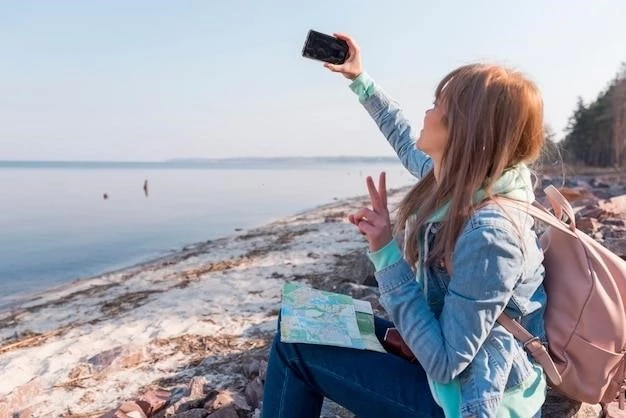Overtourism and Its Impact
The tourism industry is grappling with the consequences of its success. Destinations once considered hidden gems are now struggling with overcrowding‚ placing a strain on local resources and impacting the visitor experience. This phenomenon‚ known as overtourism‚ is pushing destinations to implement measures to mitigate its negative effects.

Sustainable and Responsible Travel
The desire for authentic and meaningful travel experiences is intersecting with a growing awareness of the environmental and social impact of tourism. This intersection is fueling the rise of sustainable and responsible travel‚ a trend poised to gain even more momentum in 2024.
Travelers are increasingly seeking out ways to minimize their footprint‚ opting for eco-friendly accommodations‚ supporting local businesses‚ and engaging in activities that contribute to the well-being of the communities they visit. This shift in mindset is driven by a desire to preserve the beauty and cultural richness of destinations for future generations.
The travel industry is responding to this demand by embracing sustainable practices. Hotels are implementing energy-efficient measures‚ reducing waste‚ and sourcing food locally. Tour operators are crafting itineraries that prioritize cultural immersion and environmental conservation. Transportation providers are exploring alternative fuels and promoting carbon offsetting programs.
This movement extends beyond superficial measures. Travelers are digging deeper‚ seeking out companies and destinations with transparent sustainability policies and certifications. They are looking beyond marketing slogans‚ demanding accountability and tangible evidence of positive impact.
This trend is not merely a passing fad; it’s a fundamental shift in how we perceive and engage with travel. It’s about acknowledging that our choices have consequences and that we have a responsibility to protect the places we visit and the people who call them home.
Here are some key aspects of sustainable and responsible travel gaining traction:
- Eco-conscious accommodations: Travelers are seeking out hotels and lodges that prioritize energy efficiency‚ water conservation‚ waste reduction‚ and the use of sustainable materials.
- Support for local communities: There’s a growing emphasis on patronizing local businesses‚ from restaurants and shops to tour operators and artisans‚ ensuring that tourism revenue directly benefits the local economy.
- Meaningful cultural exchange: Travelers are seeking authentic cultural experiences that go beyond superficial tourist attractions‚ engaging with local communities and learning about their traditions and way of life.
- Conservation efforts: Travelers are increasingly interested in supporting conservation initiatives‚ whether it’s participating in wildlife conservation projects or choosing tour operators that contribute to environmental protection.
- Carbon offsetting and sustainable transportation: Travelers are becoming more conscious of their carbon footprint‚ opting for more sustainable transportation options like trains and buses‚ and participating in carbon offsetting programs to compensate for their air travel.
The future of travel hinges on our ability to balance our desire to explore the world with the responsibility to protect it. Sustainable and responsible travel is not just a trend; it’s a necessity. By making conscious choices and supporting businesses and destinations committed to sustainability‚ we can ensure that the beauty and wonder of our planet are preserved for generations to come.
The Rise of Off-the-Beaten-Path Destinations
As overtourism continues to plague popular tourist hotspots‚ discerning travelers are increasingly seeking solace and authenticity in off-the-beaten-path destinations. This trend‚ fueled by a desire for unique experiences and a yearning for less crowded spaces‚ is redefining the travel landscape in 2024.
Gone are the days of simply checking off iconic landmarks from a bucket list. Today’s travelers are driven by a thirst for discovery‚ eager to immerse themselves in the culture‚ nature‚ and rhythm of lesser-known locales. They’re trading crowded attractions for hidden gems‚ opting for destinations that offer a sense of adventure and a chance to connect with the soul of a place.
This shift is driven in part by a desire for more sustainable and responsible travel. By venturing beyond the well-trodden path‚ travelers can help distribute tourism revenue more evenly‚ supporting local communities and minimizing their environmental impact.
Off-the-beaten-path travel is not about sacrificing comfort or convenience; it’s about embracing a different pace and perspective. It’s about stepping outside of one’s comfort zone and embracing the unexpected. It’s about forging genuine connections with local people and discovering hidden treasures that lie beyond the reach of mass tourism.
This trend is reflected in the rising popularity of:
- Emerging destinations: Countries and regions that have been off the radar for mainstream tourism are gaining traction as travelers seek out new frontiers and authentic experiences. These destinations often offer a glimpse into untouched cultures and pristine natural landscapes.
- Rural retreats: The allure of tranquil countryside settings‚ charming villages‚ and agritourism experiences is drawing travelers seeking respite from urban life and a chance to reconnect with nature.
- Adventure travel: From trekking through remote mountains to kayaking unexplored waterways‚ adventure travel offers an escape from the ordinary and a chance to challenge oneself physically and mentally.
- Slow travel: The concept of slow travel encourages travelers to linger in one place‚ immersing themselves in the local culture and savoring the journey rather than rushing from one destination to the next.
- Road less traveled: Travelers are increasingly opting for self-drive itineraries‚ exploring backroads and scenic byways‚ discovering hidden gems and local secrets along the way.
The rise of off-the-beaten-path destinations is a testament to the evolving nature of travel. It’s a reflection of our desire for more meaningful experiences‚ our commitment to responsible exploration‚ and our enduring fascination with the unknown. As we venture further from the familiar‚ we open ourselves up to a world of discovery‚ adventure‚ and connection.

The Evolution of Air Travel
The landscape of air travel is undergoing a dynamic transformation‚ driven by evolving traveler expectations‚ technological advancements‚ and economic realities. In 2024‚ we can expect to see these forces converge‚ shaping the future of how we navigate the skies.
While the allure of affordable fares remains a significant factor for many travelers‚ airlines are increasingly recognizing the demand for a more nuanced approach to pricing and service. The era of one-size-fits-all airfare is giving way to a more à la carte model‚ allowing travelers to customize their experience by choosing the level of service and amenities that align with their budget and preferences.
This shift is evident in the rise of ancillary revenue‚ with airlines offering a wider range of optional extras‚ such as extra legroom‚ early boarding privileges‚ and baggage allowances. While this approach provides travelers with greater flexibility‚ it also highlights the need for transparency in pricing to avoid hidden costs and ensure a fair and competitive marketplace.
Beyond pricing‚ airlines are investing in technology to enhance the passenger experience. From streamlined check-in processes and biometric identification to personalized in-flight entertainment systems and enhanced connectivity options‚ the focus is on leveraging technology to create a seamless and enjoyable journey.
Sustainability is also emerging as a key concern for the aviation industry. Airlines are exploring alternative fuels‚ investing in more fuel-efficient aircraft‚ and implementing operational measures to reduce their environmental footprint. Travelers are increasingly factoring sustainability into their decision-making‚ seeking out airlines that prioritize eco-conscious practices.
Here are some key trends shaping the evolution of air travel:
- Personalized pricing and service: Airlines are moving away from standardized fares‚ offering travelers more choices and control over their in-flight experience through customized bundles and optional extras.
- Technological advancements: From artificial intelligence-powered booking platforms to biometric boarding processes‚ technology is streamlining operations‚ enhancing efficiency‚ and creating a more seamless travel experience.
- Sustainability initiatives: The aviation industry is under increasing pressure to reduce its environmental impact‚ leading to investments in alternative fuels‚ more fuel-efficient aircraft‚ and operational measures to minimize emissions.
- Enhanced passenger experience: Airlines are focusing on improving the overall passenger journey‚ from comfortable seating and personalized entertainment options to improved in-flight connectivity and a wider selection of food and beverage choices.
- Rise of low-cost carriers: Budget airlines continue to expand their reach‚ offering travelers affordable options for short-haul and long-haul flights‚ driving competition and influencing pricing strategies within the industry.
As the aviation industry navigates this period of transformation‚ travelers can expect a more dynamic and personalized flying experience. By embracing innovation and prioritizing sustainability‚ airlines can meet the evolving needs of travelers while ensuring the long-term viability of air travel as a safe‚ efficient‚ and responsible mode of transportation.

Focus on Domestic Travel
While international travel is rebounding‚ 2024 is poised to witness a sustained surge in domestic travel. This trend‚ initially spurred by the pandemic’s restrictions‚ has evolved into a conscious choice for many‚ driven by a confluence of factors ranging from economic considerations to a renewed appreciation for local exploration.
Travelers are discovering—or rediscovering—the allure of their own backyards. From iconic landmarks and natural wonders to charming small towns and vibrant cultural hubs‚ domestic destinations offer a wealth of experiences that rival those found farther afield.
Economic uncertainty plays a role in this trend‚ as travelers seek to maximize their budgets without sacrificing the joy of exploration. Domestic travel often presents a more affordable alternative to international trips‚ allowing for greater flexibility in spending and a reduced financial risk.
Beyond economic considerations‚ there’s a growing desire to support local businesses and communities. By choosing domestic destinations‚ travelers can directly contribute to the economic well-being of their own country‚ fostering a sense of shared prosperity.
This renewed focus on domestic travel is also fueling a resurgence of road trips. The open road offers a sense of freedom and adventure‚ allowing travelers to set their own pace‚ explore hidden gems‚ and create lasting memories.
Here are some key factors driving the focus on domestic travel:
- Economic considerations: Domestic travel often presents a more budget-friendly option‚ allowing travelers to stretch their dollars further and enjoy more experiences without breaking the bank.
- Support for local economies: By choosing domestic destinations‚ travelers can directly contribute to the economic recovery and growth of their own communities‚ supporting local businesses and creating jobs.
- Ease of planning and accessibility: Domestic travel often involves less logistical complexity‚ making it easier to plan spontaneous getaways and navigate unfamiliar surroundings.
- Rediscovering hidden gems: Travelers are exploring lesser-known destinations within their own countries‚ uncovering hidden treasures and gaining a deeper appreciation for the diversity and richness of their own backyards.
- Rise of road trips and outdoor adventures: The open road beckons‚ offering a sense of freedom‚ adventure‚ and the opportunity to connect with nature. Road trips and outdoor adventures are experiencing a surge in popularity‚ providing travelers with a welcome escape from the confines of everyday life.
The focus on domestic travel represents a shift in mindset‚ a recognition that adventure and discovery can be found closer to home. As we continue to navigate a complex and ever-changing world‚ domestic travel offers a sense of familiarity‚ comfort‚ and a renewed appreciation for the beauty and diversity that surrounds us.

The Rise of Experiential Travel
In the evolving landscape of travel‚ a profound shift is underway‚ one that prioritizes transformative experiences over mere sightseeing. This trend‚ known as experiential travel‚ is redefining the very essence of why we travel‚ emphasizing personal growth‚ cultural immersion‚ and a deep connection with the destinations we visit.
Modern travelers‚ particularly those seeking authentic and meaningful encounters‚ are increasingly seeking out experiences that engage their senses‚ challenge their perspectives‚ and create lasting memories. They yearn to return home not just with souvenirs‚ but with stories‚ skills‚ and a renewed sense of self.
This shift is driven by a desire for authenticity and a rejection of superficial tourism. Travelers are no longer content with simply observing a destination from a distance; they want to immerse themselves in its culture‚ interact with locals‚ and participate in activities that foster a deeper understanding of the place and its people.
Experiential travel manifests in a variety of forms‚ each tailored to individual interests and passions. From culinary adventures and artisan workshops to wildlife encounters and volunteer tourism‚ the emphasis is on active participation and engagement.
Here are some key aspects of experiential travel gaining momentum:
- Culinary tourism: Food and drink are integral to a destination’s identity. Culinary tourists are seeking out authentic dining experiences‚ from street food stalls to Michelin-starred restaurants‚ participating in cooking classes‚ and exploring local markets.
- Adventure travel: From trekking through remote landscapes to white-water rafting and wildlife safaris‚ adventure travel offers a chance to push boundaries‚ connect with nature‚ and experience the thrill of the unknown.
- Cultural immersion: Travelers are seeking out opportunities to engage with local communities‚ participate in traditional ceremonies‚ learn new languages‚ and gain a deeper understanding of different cultures and perspectives.
- Wellness retreats: From yoga and meditation retreats to spa getaways and nature immersion programs‚ wellness travel focuses on rejuvenation‚ self-care‚ and personal transformation.
- Volunteer tourism: Travelers are combining their desire to explore the world with a commitment to giving back. Volunteer tourism offers opportunities to contribute to conservation efforts‚ support local communities‚ and make a tangible difference in the destinations they visit.
The rise of experiential travel signifies a shift from passive observation to active participation‚ from collecting souvenirs to collecting memories. It’s about embracing the transformative power of travel to broaden our horizons‚ deepen our understanding of the world‚ and connect us with something larger than ourselves.

Technology and Travel
The symbiotic relationship between technology and travel continues to deepen‚ with innovations transforming how we plan‚ book‚ experience‚ and share our journeys. In 2024‚ expect technology to play an even more pervasive role‚ enhancing convenience‚ personalization‚ and accessibility for travelers while empowering the travel industry to operate more efficiently and sustainably.
Artificial intelligence (AI) and machine learning are at the forefront of this technological revolution. These technologies are being harnessed to personalize travel recommendations‚ predict flight delays‚ automate customer service interactions‚ and even enhance safety and security measures. AI-powered chatbots‚ for instance‚ provide instant support to travelers‚ answering queries‚ resolving issues‚ and offering personalized suggestions in real time.
The rise of mobile-first technologies continues to shape the traveler journey. From booking flights and accommodations to navigating unfamiliar cities and translating languages‚ travelers are increasingly reliant on their smartphones as their primary travel companions. This reliance has spurred the development of sophisticated travel apps that offer a seamless and integrated experience‚ aggregating information‚ providing real-time updates‚ and facilitating bookings with a few taps on a screen.
Here are some key ways technology is reshaping the travel landscape:
- Personalized recommendations: AI-powered platforms analyze vast amounts of data to curate personalized travel recommendations‚ suggesting destinations‚ accommodations‚ activities‚ and dining experiences tailored to individual preferences and interests.
- Seamless booking and planning: Travel booking platforms have become increasingly sophisticated‚ allowing travelers to compare prices‚ view reviews‚ book flights and accommodations‚ and even reserve rental cars and tours with ease.
- Enhanced in-destination experiences: Augmented reality (AR) and virtual reality (VR) technologies are enriching the travel experience by overlaying digital information onto the real world‚ providing virtual tours of landmarks‚ and creating immersive experiences that transport travelers to distant lands.
- Sustainable travel solutions: Technology is playing a crucial role in promoting sustainable travel practices. From carbon footprint calculators to ride-sharing platforms and apps that connect travelers with eco-friendly accommodations and tour operators‚ technology is empowering travelers to make more conscious choices.
- Contactless travel: The pandemic accelerated the adoption of contactless technologies‚ from mobile check-in and digital boarding passes to contactless payments and keyless room entry. These innovations enhance convenience and hygiene‚ streamlining the travel experience while minimizing physical contact.
As technology continues to evolve at an unprecedented pace‚ its impact on the travel industry will only deepen. By embracing innovation and harnessing the power of technology‚ the travel industry can create a more seamless‚ personalized‚ sustainable‚ and enriching experience for travelers worldwide.
The Growing Importance of Wellness Tourism
The pursuit of well-being is increasingly intertwined with travel aspirations‚ giving rise to a thriving wellness tourism industry. This trend‚ fueled by a growing awareness of the importance of physical‚ mental‚ and spiritual health‚ is transforming the travel landscape‚ with destinations and businesses adapting to meet the evolving needs of health-conscious travelers.
Wellness tourism extends far beyond traditional spa vacations. It encompasses a wide range of experiences and destinations that prioritize holistic well-being‚ from yoga and meditation retreats to fitness-focused adventures and destinations renowned for their healing properties.
This trend reflects a societal shift towards prioritizing self-care and seeking out experiences that nourish the mind‚ body‚ and soul. Travelers are increasingly incorporating wellness practices into their itineraries‚ seeking rejuvenation‚ stress reduction‚ and personal transformation.
The travel industry is responding to this demand with a surge in wellness-oriented offerings; Hotels are incorporating spas‚ fitness centers‚ and healthy dining options into their amenities. Tour operators are crafting itineraries that focus on mindfulness‚ adventure‚ and cultural immersion‚ often in collaboration with wellness practitioners and experts.
Here are some key aspects of the growing wellness tourism trend:
- Holistic wellness retreats: These retreats offer a sanctuary for relaxation‚ rejuvenation‚ and personal growth‚ often combining spa treatments with yoga‚ meditation‚ healthy cuisine‚ and mindfulness practices.
- Fitness-focused adventures: From hiking and biking tours to surfing camps and adventure races‚ fitness-focused travel combines physical activity with exploration and a connection with nature.
- Mental health retreats: These retreats provide a supportive environment for those seeking to improve their mental well-being‚ offering therapy sessions‚ mindfulness practices‚ and stress reduction techniques.
- Spiritual journeys: Travelers are embarking on pilgrimages‚ visiting sacred sites‚ and participating in spiritual practices to foster a sense of purpose‚ connection‚ and inner peace.
- Nutrition and healthy cuisine: Destinations renowned for their healthy cuisine and culinary traditions are attracting travelers seeking to nourish their bodies and expand their palates.
Wellness tourism is not merely a trend; it’s a reflection of a societal shift towards prioritizing well-being as an integral part of a fulfilling life; As travelers seek out experiences that nourish their mind‚ body‚ and soul‚ the travel industry will continue to adapt and innovate‚ offering a diverse array of wellness-oriented options to meet this growing demand.










